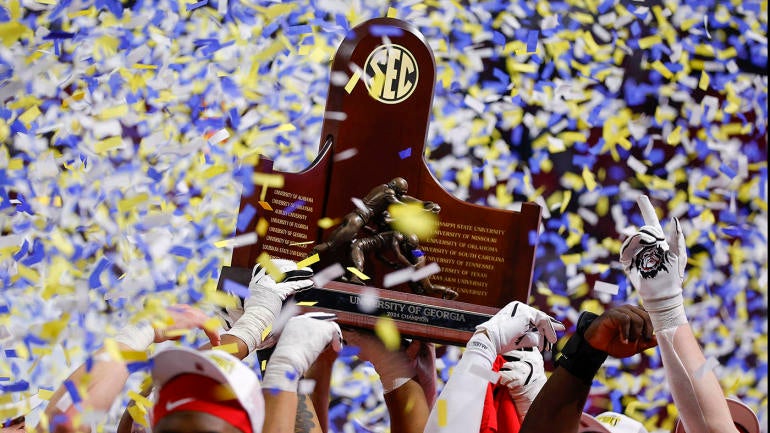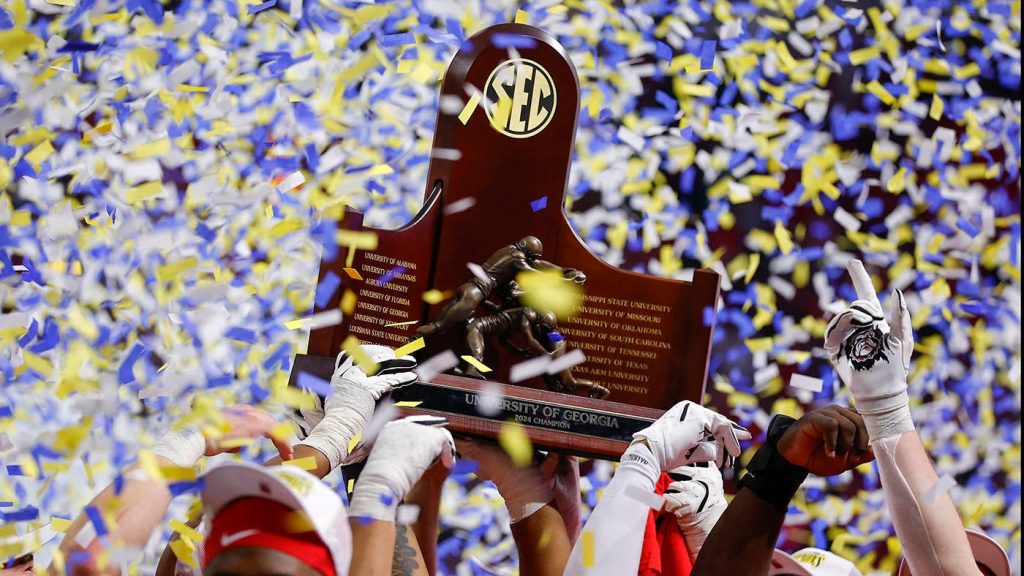Ohio State did not play for a Big Ten championship and Notre Dame is an independent, but they square off for a national title anyway

ATLANTA — The value of a conference championship has diminished before our eyes. Like it or not, they just don’t matter as much.
Monday’s Notre Dame-Ohio State College Football Playoff National Championship was long ago guaranteed to produce only the fourth ever national champion that did not win its conference in the championship game era.
That history goes back to 1998, when the BCS first decided the championship on the field. Since then, Alabama (2011, 2017) and Georgia (2021) did not win the SEC title game but won the national championship. In both 2011 and 2017 the Crimson Tide didn’t even play in the SEC title game.
Eight times in 26 years (BCS/CFP), at least one team that didn’t win its conference played for the national championship. Perhaps most infamously, Nebraska in 2001 lost by 26 at Colorado in the last regular-season game, didn’t qualify for the Big 12 title game and still got to play Miami for a national championship. (Pre-1998 Notre Dame, Miami, Army, Pittsburgh, Syracuse and Penn State won championships as independents.)
We knew with the expanded playoff this season, the likelihood of a conference runner-up (or worse) winning it all would increase. It had already been determined that in 2024 and 2025, there are five guaranteed CFP spots (all conference champions) and seven at-large teams. Beginning in 2026 almost everything regarding the CFP is up for reconsideration.
For now, simple math screams that what happens Monday night might become the norm. We knew 15 days ago a conference champion would not win the 2024 national championship. Knocked out in order over a three-day period (Dec. 31-Jan. 2) was Mountain West champion Boise State, Big 12 champion Arizona State, Big Ten champion Oregon and SEC champion Georgia. ACC champion Clemson was eliminated in the first round by Texas.
Should conference titles matter? No one ever asks if the Super Bowl champion has won its division. All that matters in the NFL playoffs is seeding and home field.
And the college game looks more and more like the NFL.
Conference championships are lucrative parts of any media rights deal with Power Four schools each getting $2 million-$4 million added to their bottom line annually. The games are appointment viewing and moneymakers for rightsholders. That is not insignificant. The games in the SEC and Big Ten are traditional annual events.
Texas desperately wanted to win the SEC in its first season but lost in overtime in Georgia. That led to this somewhat eyebrow-raising comment last week from Steve Sarkisian.
“I don’t know if it will ever be diminished to the fact of that’s always one of the goals, right?” the Texas coach said of conference titles. “Especially when you’re in the Southeastern Conference or the Big Ten, there’s so much history and tradition to these conferences that it means a ton. But I also know there’s this other carrot that schools like us strive for as well.”
CBS Sports spoke to a person intimately involved with the modeling of the CFP process. The person responded anonymously because of the sensitivity of the subject.
“They’ll give it up,” that source said of league title games. “The coaches do not want to play it. [Georgia coach Kirby Smart] had already been saying ‘We shouldn’t be playing this game’ and then they lose their quarterback. When [the] expands to 14 or 16 it will especially not make sense.”
An elimination of league title games would require the conferences to be made whole in regard to the lost revenue. The source suggested that money could be made up from rightsholder ESPN if the bracket expands.
It is already known ESPN doesn’t have to pay for expansion from 12 to 14 because of the language in the current contract. Sources have told CBS Sports that expansion to 16 (beginning in 2026 at the earliest) might be too big a leap, at least in near term.
The nine FBS commissioners and presidents (plus Notre Dame) will gather here Sunday at their annual championship game meeting. Another, more significant meeting, is expected in late January or February where the parties could consider expansion and automatic qualifiers. The SEC and Big Ten are on record as desiring AQs.
Meanwhile, the Big Ten Championship Game between Oregon and Penn State was essentially for seeding. There was already the issue of teams playing a record 17 games in any given season in the expanded bracket. There is that student-athlete welfare issue if that matters at all. When the expanded bracket was approved, the FBS presidents thought nothing at all of approving a system that would require a team — in some years — playing four additional postseason games.
However, eliminating champ games would allow flexibility to play first-round games in the second week of December. That would conceivably spread out the playoff. Currently the 11 games are played over a 32-day stretch.
Former Ohio State coach Jim Tressel can speak to the issue. His Youngstown State teams won four FCS championships in seven years. Those teams didn’t play a league championship game. Tressel’s championship teams were either independent or a runner-up in the Gateway Conference.
FCS teams typically play an 11-game regular season, then proceed to the playoff. The Penguins played 60 games in a four-year stretch from 1991-1994. (15 games each season)
“That’s a grind,” Tressel said. “It’s easy for me to say, I would shorten the regular season. The ADs are used to making that money. Now they’re losing some of that revenue because they’re going to share it, finally, with players. It took them 50 years to figure that out.”
That issue will resolve itself sooner or later and filter down to the CFP. For now, it’s hard to consider, but it turns out Ohio State’s Michigan game was also for seeding. As painful as it was, the Buckeyes were eliminated from the Big Ten Championship Game with that loss. They showed up as a No. 8 seed that has beaten three top-seven teams to get here –Tennessee, Oregon and Texas.
For now, there is no overt discussion about dropping championship games; more to the point this weekend is how to treat the teams participating in those championship games.
The Big Ten is, in essence, seeking two more championship games as entry points into the playoff. CBS Sports reported last month that the league was looking into a “Championship Saturday” in which not only would its top two teams play, but also the No. 6 seed vs. the No. 3 and No. 4 vs. No. 5. The winners would automatically qualify for the CFP.
Army and Navy have already petitioned the NCAA Football Oversight Committee to add a 13th regular-season game before the American Championship Game to enhance CFP access. The schools currently play only 11 games before that championship Saturday. That is followed by the annual Army-Navy game that does not count toward conference championship or CFP eligibility.












